Abe's Yasukuni visit sparks world condemnation
Updated: 2013-12-29 16:00
(Xinhua)
|
||||||||
BEIJING - Japanese Prime Minister Shinzo Abe's latest visit to the controversial Yasukuni shrine may have stirred a wider range of condemnation than he had expected.
From Japan's neighbors to its decades-long allies, the whole world continues to denounce his move, leaving him isolated in the international arena.
Yonhap News said Sunday South Korea had canceled a series of defense meetings and military exchange programs with Japan, showing increasing anger at Abe's provocative act.
According to a government source, who spoke on condition of anonymity, deputy defense ministers from both countries convened a meeting last month and signed a memorandum of understanding to facilitate military exchanges between working-level officials.
But the South Korean defense ministry has decided to call off a meeting scheduled for early next year because of Abe's visit to the shrine, which honors Japanese World War II dead, including 14 class-A war criminals, Seoul described the visit as "untrustworthy behavior."
The previous day, Chinese State Councilor Yang Jiechi severely criticized the shrine visit, calling it a brazen affront to people of all countries that suffered from Japanese aggression and colonial rule.
"The Chinese people cannot be insulted, nor can people of Asia and the world be humiliated. Abe must own up to the wrongdoing, correct the mistake and take concrete measures to remove its egregious effects," Yang said in a statement.
He said the Yasukuni shrine issue boiled down to whether or not the Japanese government was able to repent its militarist aggression.
"Abe is the prime minister of Japan. His visit to Yasukuni Shrine is by no means a domestic affair of Japan, still less an act by an individual," he said.
South Korea and China, which both suffered from Japan's militarist aggression, are not alone in voicing strong dissatisfaction over the controversial move.
Major US newspapers published editorials following Abe's visit on Thursday, warning against the risky nationalism and militarism that appeared to be behind the move.
The Washington Post said Saturday it was likely to further weaken Abe's international standing and Japan's security.
By agreeing to the relocation of a US marine base in Okinawa, Japan had taken a step toward stronger military alliance with the United States, but he also complicated the prospects and undermined the cause by paying homage to the war shrine at the same time, the newspaper said.
"The Obama administration, despite its pleasure over the Okinawa base development, felt compelled to publicly criticize the Abe administration," it said. "The prime minister risks isolating his government in the region and making cooperation with the United States more difficult."
A New York Times editorial noted Friday it had been seven years since a sitting Japanese prime minister visited the Yasukuni Shrine, "a recognition at the highest levels that the site is symbolically repugnant to China and South Korea and that such a visit is detrimental to relations with them".
Abe's ultimate goal was to rewrite Japan's pacifist Constitution, which restricts the right to go to war, it said, adding it was a move of which Japanese Emperor Akihito disapproved.
A Wall Street Journal editorial said the same day that Abe's visit triggered criticism from China, South Korea and the United States, which it said was "a strange coalition that highlights the enduring delicacy of East Asian politics nearly 70 years after World War II".
It is "troubling enough" that some senior Japanese officials persist in whitewashing the truth about chemical weapons, sex slavery and other wartime atrocities, said the editorial titled "Shinzo Abe's Yasukuni Offense."
UN Secretary-General Ban Ki-moon said Friday he was aware of Abe's visit, saying "it is highly regrettable that tensions from the past are still plaguing the region".
Ban said "leaders bear special responsibility to be sensitive to the feelings of others, especially the memory of victims, as the region should strive to be forward-looking and harmonious".
"The secretary-general has consistently stated that the countries in Northeast Asia are important partners for the United Nations whose contribution is significant in shaping our future," his office added.
Abe's move has also stirred huge domestic debate. Kyodo news said in an editorial Saturday the prime minister's decision to visit Yasukuni Shrine was not only a disappointment, but a grave tragedy for the overwhelming majority of Japanese and their American friends.
"Prime Minister Abe had a unique opportunity to close the chapter on the war and change the subject to Japan's future role in the region. Instead, he has chosen to go backwards, not forward," the news service said.
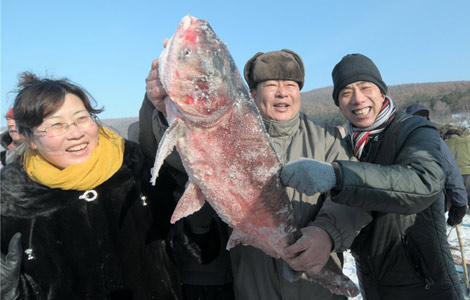
 Ice fishing in NE China
Ice fishing in NE China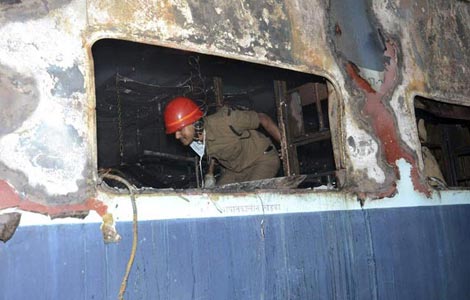
 Fire on express train in India kills at least 26
Fire on express train in India kills at least 26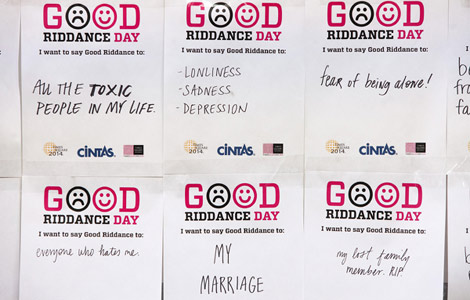
 Times Square visitors purge bad memories
Times Square visitors purge bad memories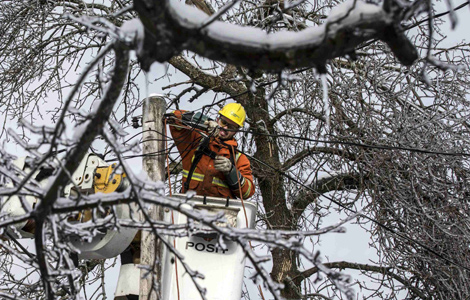
 Ice storm leaves many without power in US, Canada
Ice storm leaves many without power in US, Canada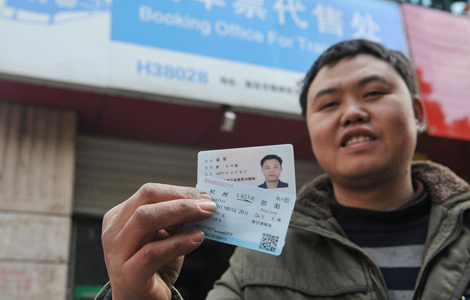
 'Chunyun' train tickets up for sale
'Chunyun' train tickets up for sale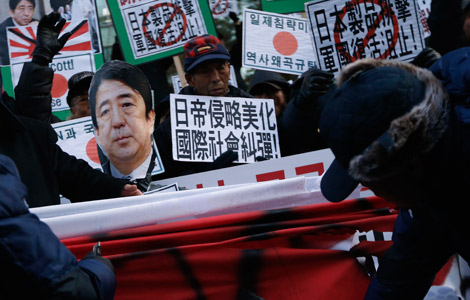
 Abe's war shrine visit sparks protest
Abe's war shrine visit sparks protest
 LeBron James is AP's Male Athlete of the Year
LeBron James is AP's Male Athlete of the Year
 Year-end horse-ride parade California
Year-end horse-ride parade California
Most Viewed
Editor's Picks

|

|

|

|

|

|
Today's Top News
High stakes for US people losing jobless benefit
Abe's shrine visit a denial of justice
China's high-speed rail on fast track
US judge upholds NSA program
India train fire kills at least 26
China reports 12th vaccine-related death
China begins e-commerce legislation
Li drops in to help realize home dream
US Weekly

|

|







